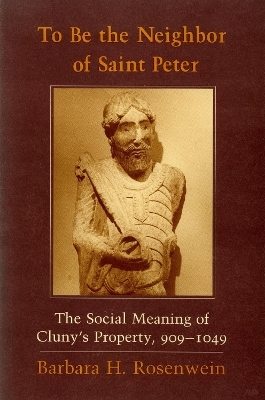
To Be the Neighbor of Saint Peter
The Social Meaning of Cluny's Property, 909–1049
Seiten
1989
Cornell University Press (Verlag)
978-0-8014-2206-5 (ISBN)
Cornell University Press (Verlag)
978-0-8014-2206-5 (ISBN)
- Titel z.Zt. nicht lieferbar
- Versandkostenfrei
- Auch auf Rechnung
- Artikel merken
Barbara H. Rosenwein here reassesses the significance of property in the tenth and eleventh centuries, a period of transition from the Carolingian empire to the regional monarchies of the High Middle Ages. In To Be the Neighbor of Saint Peter she...
Barbara H. Rosenwein here reassesses the significance of property in the tenth and eleventh centuries, a period of transition from the Carolingian empire to the regional monarchies of the High Middle Ages. In To Be the Neighbor of Saint Peter she explores in rich detail the question of monastic donations, illuminating the human motives, needs, and practices behind gifts of land and churches to the French monastery of Cluny during the 140 years that followed its founding. Donations, Rosenwein shows, were largely the work of neighbors, and they set up and affirmed relationships with Saint Peter, to whom Cluny was dedicated.
Cluny was an eminent religious institution and served as a model for other monasteries. It attracted numerous donations and was party to many land transactions. Its charters and cartularies constitute perhaps the single richest collection of information on property for the period 909–1049. Analyzing the evidence found in these records, Rosenwein considers the precise nature of Cluny's ownership of land, the character of its claims to property, and its tutelage over the land of some of the monasteries in its ecclesia.
Barbara H. Rosenwein here reassesses the significance of property in the tenth and eleventh centuries, a period of transition from the Carolingian empire to the regional monarchies of the High Middle Ages. In To Be the Neighbor of Saint Peter she explores in rich detail the question of monastic donations, illuminating the human motives, needs, and practices behind gifts of land and churches to the French monastery of Cluny during the 140 years that followed its founding. Donations, Rosenwein shows, were largely the work of neighbors, and they set up and affirmed relationships with Saint Peter, to whom Cluny was dedicated.
Cluny was an eminent religious institution and served as a model for other monasteries. It attracted numerous donations and was party to many land transactions. Its charters and cartularies constitute perhaps the single richest collection of information on property for the period 909–1049. Analyzing the evidence found in these records, Rosenwein considers the precise nature of Cluny's ownership of land, the character of its claims to property, and its tutelage over the land of some of the monasteries in its ecclesia.
Barbara H. Rosenwein is Professor of History at Loyola University, Chicago. She is the author of Negotiating Space: Power, Restraint, and Privileges of Immunity in Early Medieval Europe, editor of Anger's Past: The Social Uses of an Emotion in the Middle Ages, and coeditor of Monks and Nuns, Saints and Outcasts: Religion in Medieval Society, all from Cornell.
| Erscheint lt. Verlag | 6.4.1989 |
|---|---|
| Verlagsort | Ithaca |
| Sprache | englisch |
| Maße | 152 x 229 mm |
| Gewicht | 907 g |
| Themenwelt | Geschichte ► Teilgebiete der Geschichte ► Religionsgeschichte |
| Religion / Theologie ► Christentum ► Kirchengeschichte | |
| Wirtschaft ► Betriebswirtschaft / Management ► Rechnungswesen / Bilanzen | |
| Betriebswirtschaft / Management ► Spezielle Betriebswirtschaftslehre ► Immobilienwirtschaft | |
| ISBN-10 | 0-8014-2206-X / 080142206X |
| ISBN-13 | 978-0-8014-2206-5 / 9780801422065 |
| Zustand | Neuware |
| Haben Sie eine Frage zum Produkt? |
Mehr entdecken
aus dem Bereich
aus dem Bereich
Herkunft, Blüte, Weg nach Osten
Buch | Hardcover (2024)
C.H.Beck (Verlag)
CHF 55,90
Von den Anfängen bis zur Gegenwart
Buch | Hardcover (2022)
C.H.Beck (Verlag)
CHF 47,60
warum die Religionen erst im Mittelalter entstanden sind
Buch | Hardcover (2024)
C.H.Beck (Verlag)
CHF 53,20


